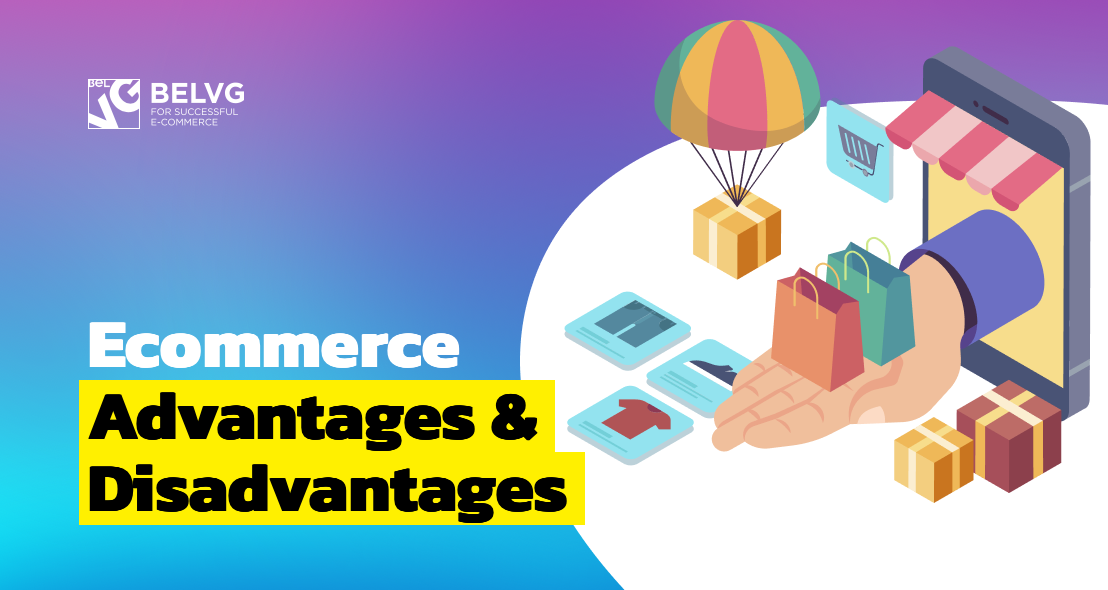
When starting a business, each owner sooner or later faces a dilemma: whether to launch a webstore or not. We can’t solve it instead of them but can give detailed pros and cons overview of ecommerce. That can help to make a thorough decision.
We’ve written this article about the advantages and disadvantages of ecommerce for those who don’t feel informed enough, are looking for the argumentation to pursue their partner, or just want to dive deeper into the topic.
Table of contents:
What does ecommerce mean?
What are the advantages of ecommerce?
What are the disadvantages of ecommerce?
What does ecommerce mean?
Ecommerce is the activity of buying and selling goods or services online. It emerged in 1982 with Boston Computer Exchange, gained popularity by 2010, and became even more popular after the covid-19 outbreak. At the moment, it can provide various capabilities to small, middle, and large-scale businesses, individuals and freelancers as it works in all imaginable forms like B2C, B2B, C2C.
Ecommerce includes but is not limited to:
- Online sales of physical goods and digital products
- Online sales of intangible digital products
- Intellectual property
- Digital services
- Real-time auctions
- Tickets’ sales
- Utility bills payments
- E-banking
- Online marketplaces
Sales of physical goods are the most widely spread category. Its revenue in 2022 reached $4.23tn. Below, you can find TOP-5 product categories that contributed the most to this number [1].
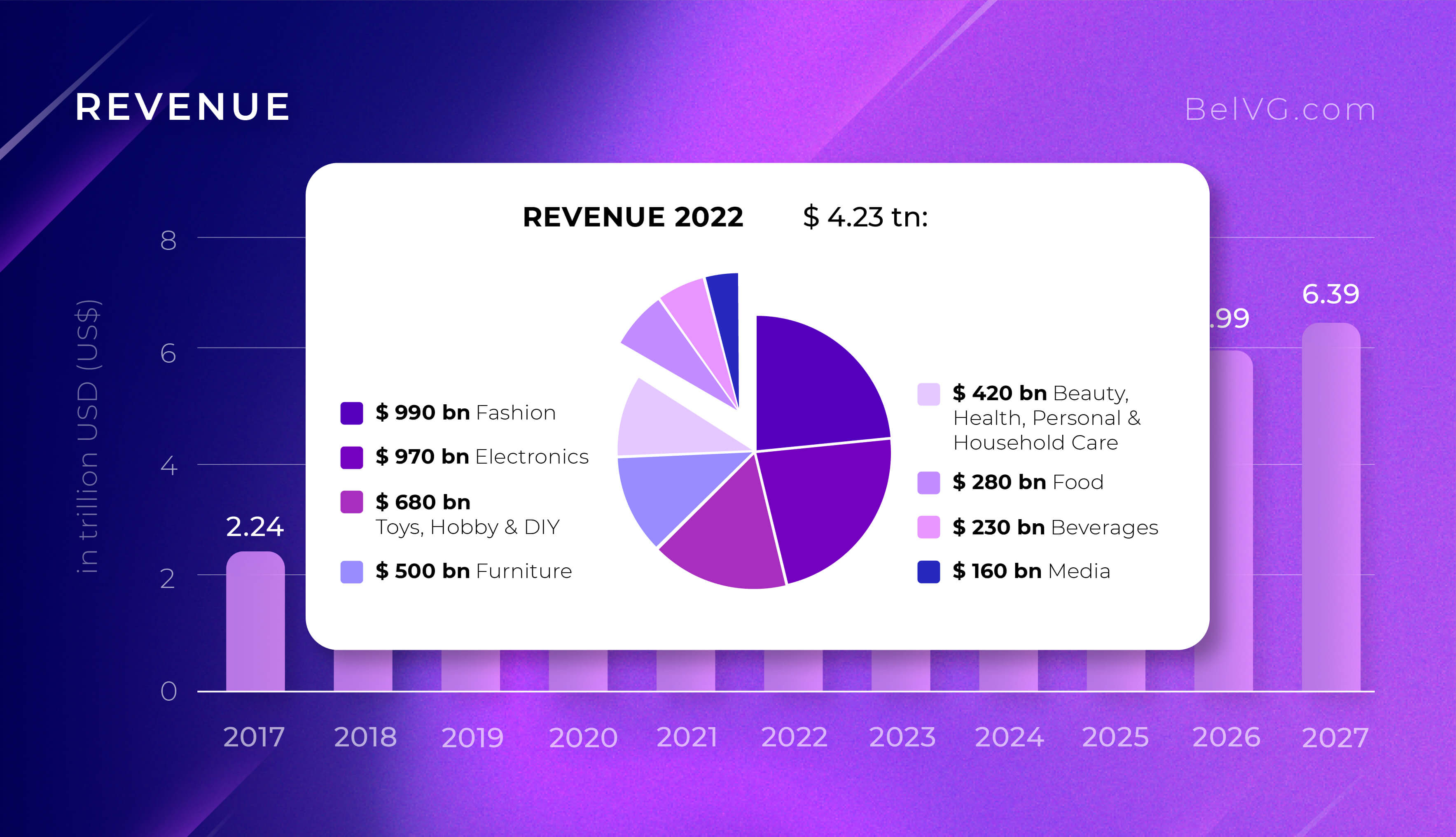
These capabilities surpass those available in traditional retail. With all the diversity and benefits, there is no surprise that over the last few years, the ecommerce business has globally enjoyed steady and substantial growth. This tendency isn’t going to change – ecommerce is expected to keep growing, reaching $5.88 trillion in global sales by the end of 2025 according to Statista [2].
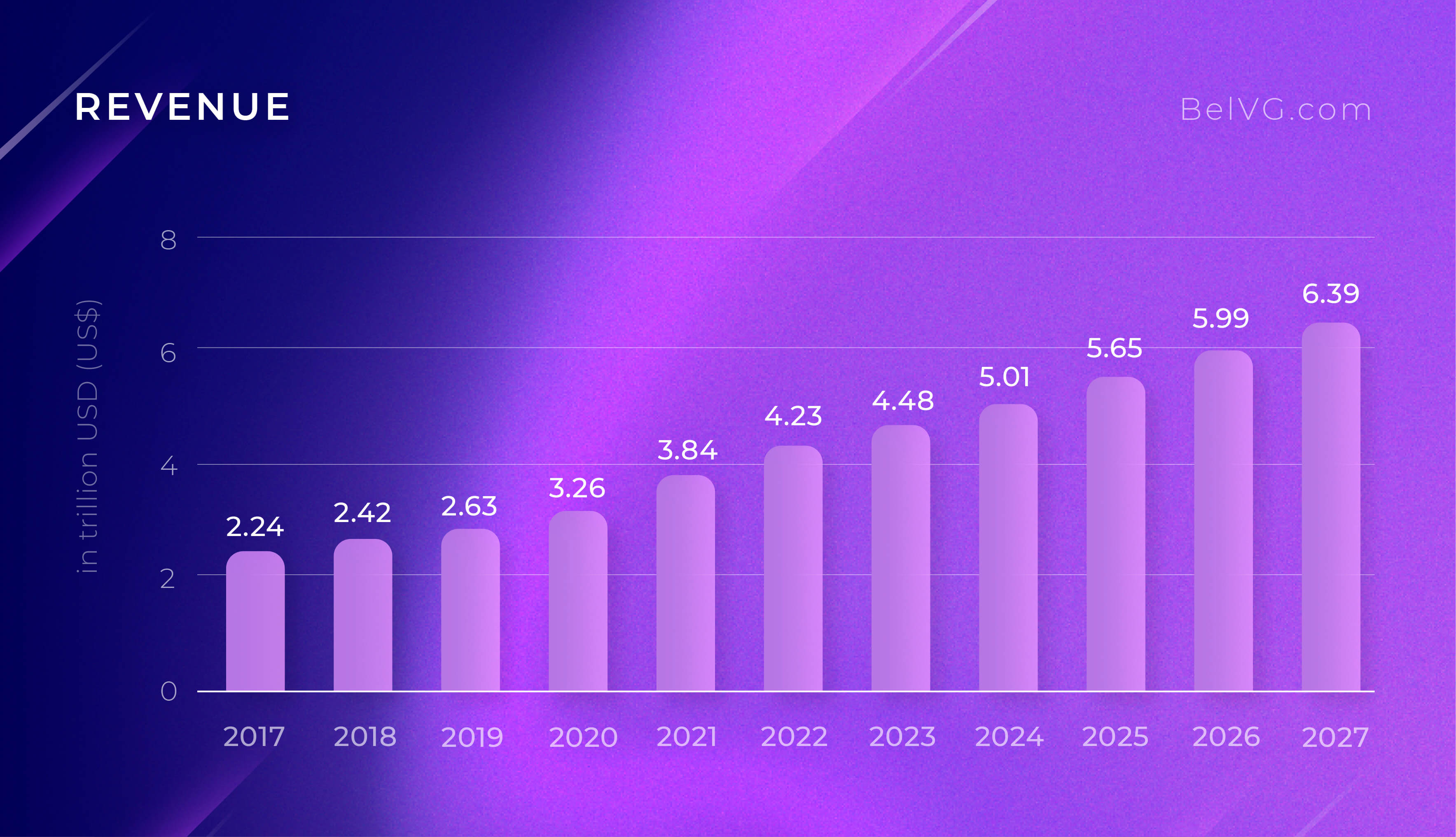
Ecommerce keeps taking up the share of traditional retail. Throughout history, some companies crashed due to their inability to confront online businesses, and those who made a success story. Below you can find out how ecommerce has changed the global market.
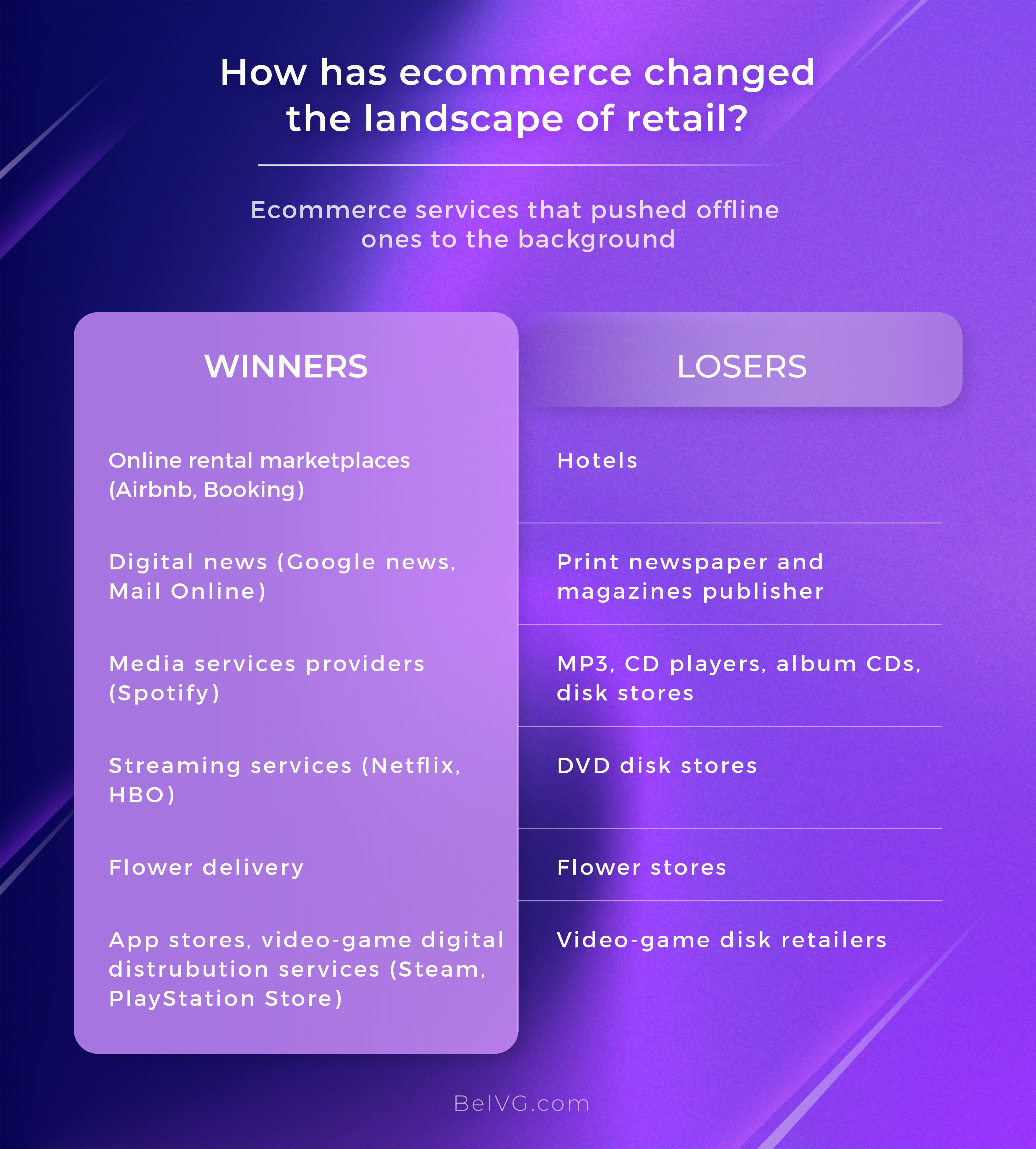
A good example of ecommerce influence on trading is the app development industry. About 20 years ago stores were loaded with various disks keeping games, applications, and movies. But the digital breakthrough made it possible to provide them online. Such well-known platforms as Steam, Google Play Store, Netflix, and more were established. And that’s how ecommerce made disks almost useless.
The same situation takes place with newspapers and magazines. Two decades ago almost everyone read printed matters to find out what was going on around them. But today you can hardly find a newsstand. Smartphones made the latest news available in a second. The top magazines and newspapers like Forbes and the New York Times run their websites making money on subscriptions. It happens not only because of the ecommerce influence but also because of the reforestation motives. A great benefit of ecommerce for the planet.
All this might be enough for you as an entrepreneur to consider starting an online store. Although the ecommerce pluses are evident, it’s still unwise to get into the undiscovered activity. That’s why we’ve done some research and are ready to familiarize you with both advantages and disadvantages of an ecommerce business.

Ecommerce Development
Take your online store to the next level with BelVG ecommerce development
Visit the pageWhat are the advantages of ecommerce?
The advantages of ecommerce can be divided into two huge groups: those for the customer and the business owner. In this article, we’ll study the latter. But it’s important to at least know the pros online shopping gives to customers. They include
- mobility as you can buy from anywhere
- delivery system
- no queues
- full product description
- buyer reviews.
The advantages for retailers are listed and reviewed below.
Advantage No 1: Saves business resources
Most customers want to know as much as possible about the product before making a purchase. And a brand manufacturer has text limits on the package. That’s why at a brick-and-mortar store, the sales assistant has to know additional product information to share it with customers. So, the owner uses resources to hire enough staff and educate them.
At the webstore, a retailer can add a product information page with macrophotos, tutorials, buyer reviews, and a list of related products. All this information not only makes a great contribution to a more conscious “to buy or not to buy” decision but also minimizes staff functions. So, the owner needs just a few people who help clients online.
Advantage No 2: Requires lower costs for maintenance
Running an offline store is an expensive activity: rent of the facility, utility bills, insurance, warehouse maintenance, and staff salary. Owners should also keep in mind a high number of operational costs like repair service bills, employee training, and advertising costs. With an ecommerce website, you pay only to build up a webstore and then to maintain it, including payments for a warehouse.
Advantage No 3: Sets no geographical and time limits
The location of a brick-and-mortar store significantly restricts trade opportunities. While in ecommerce, you have no geographical limits. You can extend your market without renting an extra office somewhere. And thanks to improved logistics and delivery technologies, worldwide shipping will be an achievable goal. Payment, in its turn, can be performed even if your credit card isn’t with you at the moment by such tools as Apple Pay, PayPal and others.
A webstore doesn’t set time limits as well. It’s open 24/7 and accepts orders around the clock. While an offline shop works only 8-10 hours per day.
Advantage No 4: Extends knowledge about clients
Running a brick-and-mortar store, it’s difficult to know who your customers are. Where do they work? What are their hobbies? Did they find everything they looked for? Would they buy any related products in your store? A shop owner needs to hold time and money-consuming research to gain that knowledge.
With the help of cookies you can collect customer information and get a clear understanding of who they are: gender, age, interests, kinds of advertisements they better respond to, etc. Using this data, you can configure the store to automatically offer customers the products they are most likely to like and set up an advertisement with a good click-through rate.
Advantage No 5: Allows to retarget customers
It often happens at brick-and-mortar that even customers who are interested in the item leave the store without a purchase. It happens because many people need time to think it over, especially if the price is high. And lots of them forget about a planned purchase by the end of the day. Unfortunately, there is no chance to remind them. Running a webstore, you have that chance.
Retargeting is an advertisement technology that shows your customer the ads of the product they viewed at the online store before. It helps to unobtrusively remind customers of the product they liked, urging them to come back to the store and make a purchase.

Magento Web design
Take your online store to the next level with BelVG Magento web design services
Learn moreAdvantage No 6: Proposes more affordable and effective marketing
Promoting a physical store, you use traditional marketing practices such as printed press, radio, TV commercials, direct mail, and telephone. Such strategies offer little interaction with the audience and yield a poor conversion ratio. And an online promotion requires at least a website.
Ecommerce works with digital marketing that provides a broader scope of operation and a bigger number of activities, including content marketing, SEO, affiliate marketing, email marketing, pay-per-click, and social media marketing. Unlike the radio or TV, these tools allow the narrowing of the audience. A shop marketer can specify potential clients by age, gender, city of residence, hobbies, and Google request and as a result, broadcast the advertisement only for the needed audience.
Advantage No 7: Minimizes human error
The majority of store operations are integrated into an ecommerce platform and perform automatically. It diminishes the probability of such mistakes as a misplaced order or incorrectly charged bill. Moreover, the situation when a sales manager follows and annoys a customer is impossible to happen. However, not to leave the potential buyers alone, a business owner can create a FAQ page and use virtual assistance.
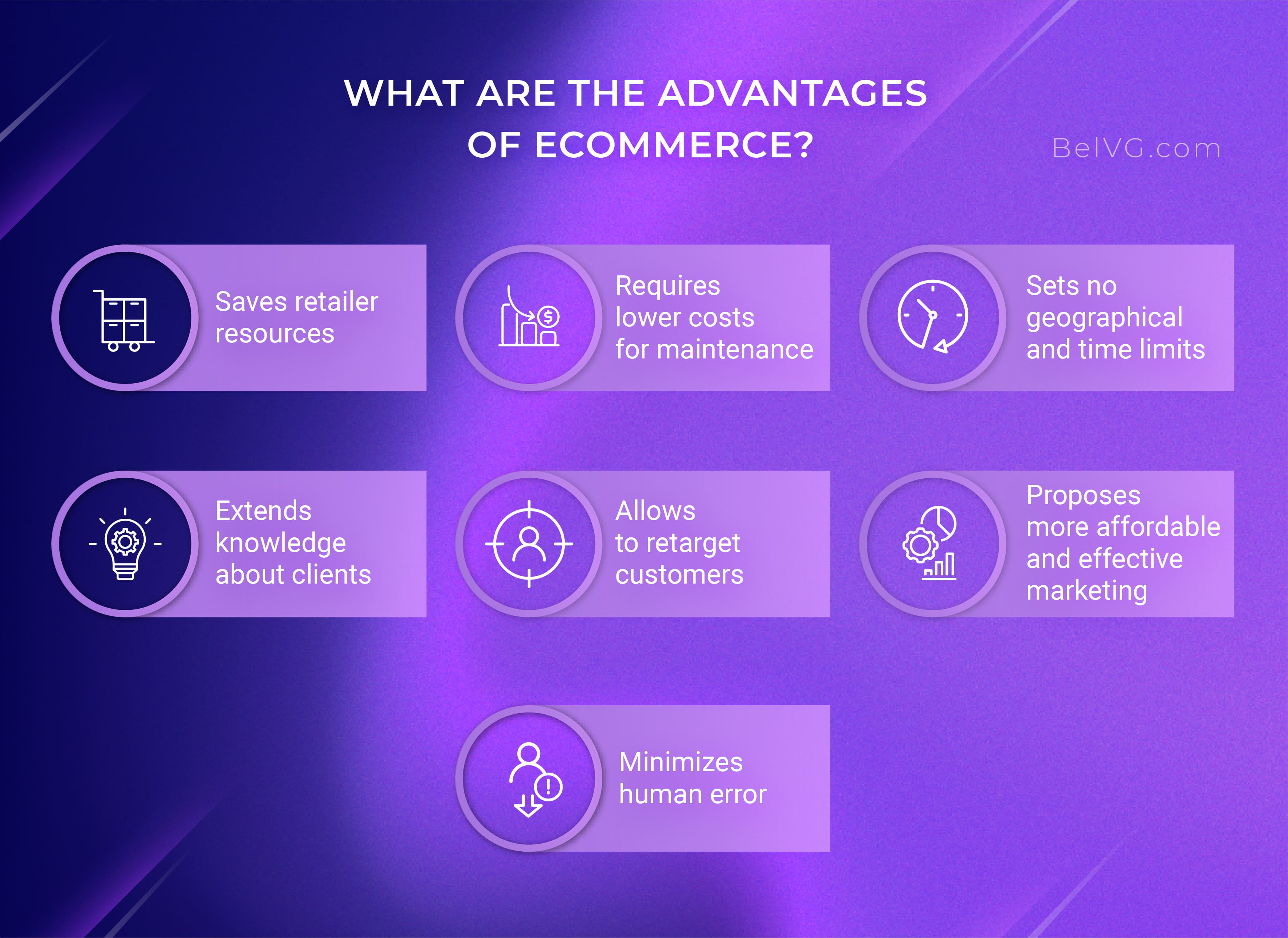
What are the disadvantages of ecommerce?
Apart from numerous advantages, some disadvantages make ecommerce unsuitable for some businesses. Let’s explore them in detail and try to figure out if they are significant enough to stop you from launching a webstore.
Disadvantage No 1: Increases the uncertainty about the product quality
An online store provides a detailed product description but doesn’t allow customers to see or feel the item before purchasing. As a result, they can’t make sure whether the description lies or not. Here the main role in customer decision plays the store’s reputation and positive reviews. The business owner has to closely monitor the quality of selling products to keep customer loyalty.
Disadvantage No 2: Leads to delivery difficulties
Shipping often becomes a headache for store owners. Once you decide to run an ecommerce business, you need to devise the delivery logistics, find the carriers, make sure that the products will be shipped correctly and on time, and deal with all sorts of delays and complications. In the worst scenario, the purchase might never be delivered, either lost in the mail or sent to the wrong address.
However, in the last few years, a tendency appeared to minimize these worries. Delivery companies use track codes so that both a sender and a receiver can control the shipping process. The pandemic also played a part in adjusting the delivery system. And how this disadvantage seems to lose significance.
Still, If you’re launching an online store, think about organizing a delivery with a specialized company instead of trying on your own.
Disadvantage No 3: Doesn’t suit every type of product
There are certain limits to ecommerce capabilities such as products that are difficult to select correctly or suit perfectly. Among them are high-priced items such as custom-made items, luxury clothes, and furniture. The most progressive shop owners successfully implement Augmented Reality technologies in their webstores, but this is still a very rare practice.
Another type of product which is unpopular in online retail is the one that needs a related service to accompany their purchase, like a roof luggage rack for a car that needs installation.
Disadvantage No 4: Requires complex taxation guidelines
If you sell your products worldwide you need to comply with the taxation guidelines adopted to the standards of each country you’re delivering. Apart from making sure you can comply with them, you’ll need to deal with the question of cost-effectiveness for your enterprise.
Disadvantage No 5: Needs compulsory registration
In most cases, a customer needs to register at the website to complete an order. And the problem here is that many people don’t want to sign up. Due to the increased frequency of hacker attacks, it’s understandable why some customers are reluctant to submit their name, email address, and other personal data to an online store. Also, some make purchases in a hurry and don’t want to spend time on a rather lengthy registration process.
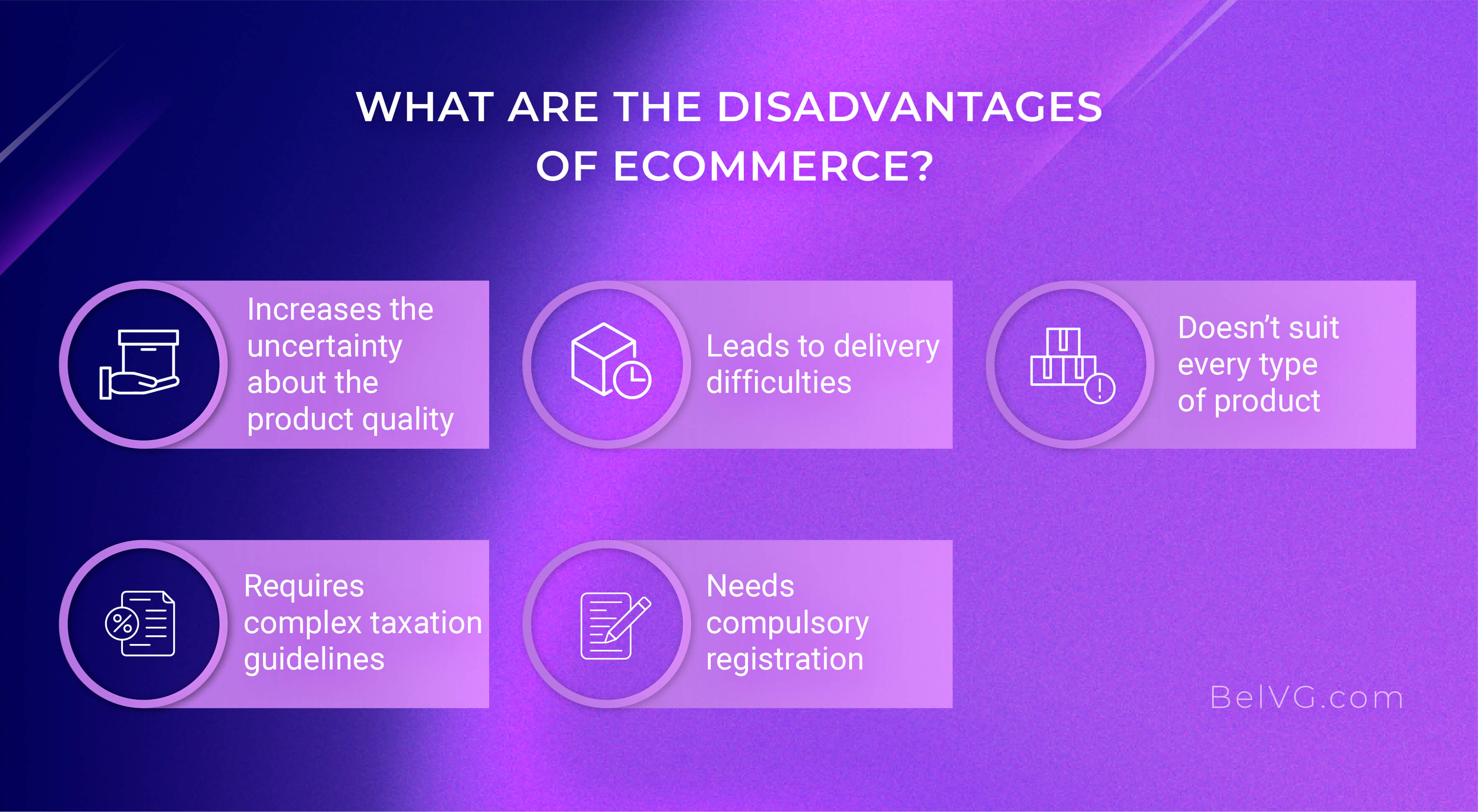
Wrapping it up
We’ve studied the detailed list of the ecommerce advantages and disadvantages.
This type of store has several advantages over offline business. It requires lower costs and resources to maintain, allows selling worldwide without binding to a particular location, and offers rich marketing instruments to interact with, target and stay in touch with the audience.
At the same time, there are several disadvantages mostly connected with customer uncertainty about quality, delivery methods and security of personal and payment data. But the tendency shows that they are becoming more insignificant while ecommerce develops.
We hope you find this article helpful! If you have anything to share about ecommerce, feel free to leave your ideas in the comments below!





It’s a great post. This blog is so interesting to me.
provides a complete information about pros and cons of e-commerce is very useful.
I appreciate you sharing this.
Thanks for your post. It’s clear!
Thank you for sharing this fantastic blog. It provided me with a wealth of information, as well as an understanding of the benefits and drawbacks of ecommerce.
Thanks for sharing this information.
Thanks for sharing your thoughts about e-commerce. Very Helpful. You really did a lot of research.